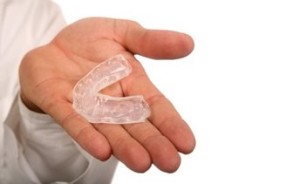By: Dr Elizabeth Eggert
 We’ve all experienced the way stress manifests itself in our bodies. Tension headaches are just one common example. But many of us hold stress in our jaws or relieve stress by grinding our teeth. We might not even know we’re doing so, leading to discomfort and pain down the road.
We’ve all experienced the way stress manifests itself in our bodies. Tension headaches are just one common example. But many of us hold stress in our jaws or relieve stress by grinding our teeth. We might not even know we’re doing so, leading to discomfort and pain down the road.
Habitual clenching or grinding can cause a variety of problems with your jaw and teeth. It can overwork your muscles and periodontal ligaments, cause pain, and overstress your teeth. In extreme cases, forceful and repetitive clenching and grinding may even break teeth. Clenching and grinding can also overstress and cause pain and damage to the temporomandibular joint (TMJ). To avoid these painful conditions, our dentists at Eggert Family Dentistry may recommend that you be fitted for a splint or night guard.
What does a splint or night guard prevent?
Splints and night guards protect your teeth and jaw from bruxism. Bruxism is the involuntary grinding of your teeth or clenching of your jaw. Clenching and grinding can occur during the day or night. Most people are not aware they even grind or clench.
But we are able to see the evidence of bruxism during your check-ups. We see patterns in the wear of your teeth and might notice you have highly developed jaw-closing muscles. In these cases, we might recommend splint therapy.
What is splint therapy?
Splint therapy, changes the position of your jaw to a relaxed muscle position by creating stable muscles and jaw joints. We use several different tools in splint therapy, including a Lucia Jig, an anterior deprogrammer, or a TMJ splint. Splint therapy may last a number of weeks or months, during which you come in for regular therapy appointments.
In an ideal situation, the teeth can then be changed to fit together at the same position where the jaw is relaxed. There are three typical methods to help this occur: equilibration of the teeth, orthodontics, or dental restorations. Some people elect not to change their teeth and to continue with their splint only. In these cases, sometimes the muscles stay stable with only night-time use of the splint.
What about night guards?
Night guards are appliances you wear while you sleep. A guard fits over your teeth and prevents them from grinding together. Though you can buy moldable night guards at the pharmacy, investing in a custom night guard we create ensures your appliance fits comfortably and correctly for years of use. The OTC night guards tend to be too bulky and often make people clench or grind even more than before. The main difference between a simple night-guard and splint therapy is that we cannot confirm that the night guard will keep you in your most relaxed muscle position.
It’s important that you take your dentist’s recommendation for splint therapy or night guards seriously. When left untreated, clenching and grinding can cause oral health issues down the road. If you suspect you clench your jaw or grind your teeth while you sleep or anytime, contact Eggert Family Dentistry today. Call (651) 482-8412.